A Century of John Milton Ward
Andrea Cawelti
Thursday, July 6, 2017
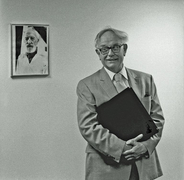
The following is a guest post by Andrea Cawelti, Ward Music Cataloger at Harvard University’s Houghton Library, with contributions concerning the Ward materials in RISM by Christina Linklater, Keeper of the Isham Memorial Library and Houghton Music Cataloger.
Today, John Milton Ward, the donor of the Harvard Theatre Collection’s Ward Collection, would have been 100 years old. Having spent most of my formative Harvard years working with him, I’d like to take a moment to share some thoughts. I began working for John Ward in 2002, so his professor and musicologist personas were mostly behind him (though he never altogether shed his role as teacher). He studied composition privately with Darius Milhaud and studied musicology at the University of Washington (M.M. 1942), Columbia University, and New York University (Ph.D. 1953, “The vihuela de mano and its music”). The professors he mentioned most often to me were the Renaissance scholars Otto Gombosi and Gustave Reese, and musicologist Curt Sachs. From 1947 to 1953 Ward was an instructor at Michigan State University and from 1953 to 1955 an assistant and then an associate professor at the University of Illinois. In 1955 he joined the faculty of Harvard University, where he became William Powell Mason Professor of Music in 1961.
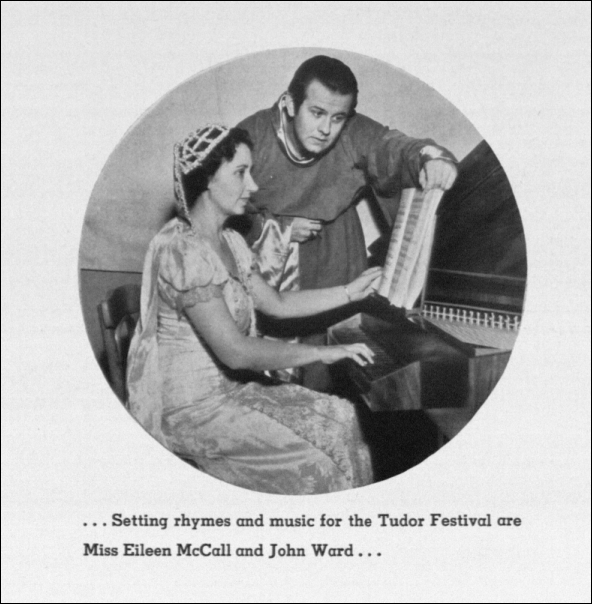
John Ward in 1940, with Eileen McCall, a music professor at San Francisco State College.
Ward was born in Oakland, California, but spent a good bit of his youth across the bay in San Francisco. He frequently ushered at the War Memorial Opera House, and often recalled going backstage to meet performers (with particular emphasis on ballerinas). He attended San Francisco Junior College, and then San Francisco State College, where with Eileen McCall’s help, he organized a Tudor Festival which he credited as the birth of his deep love for Tudor music. He was quite star-struck as a young man, and during this time amassed his first large collection, that of celebrity autographs. When he left for graduate school at the University of Washington, he unloaded the entire collection, which in later years he regretted, particularly the Gershwin manuscript inscribed to him. I’ve always hoped that it would turn up somewhere for sale, as I felt that Ward would delight in having that manuscript return to become part of the Ward Collection.
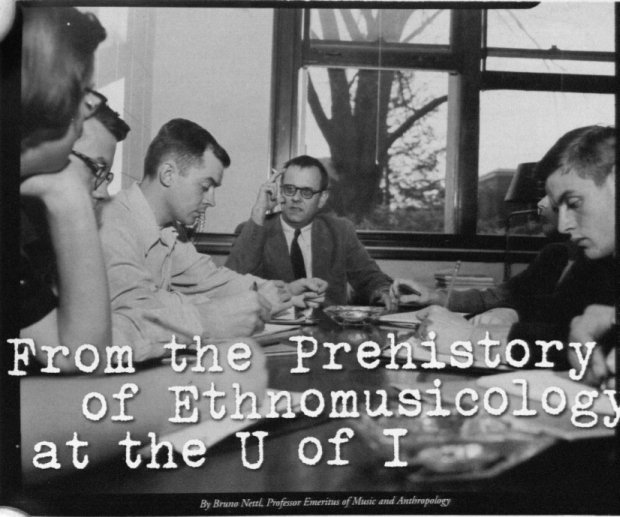
Ward teaching ethnomusicology at the University of Illinois.
Otto Gombosi was Ward’s most frequently mentioned influence. Gombosi espoused questioning everything; always returning to primary source material to confirm and strengthen one’s theories and research. In conversation, Ward would point to this as both the cornerstone of his own scholarship, and the seed of his collecting style: having access to every form and format of a given work was his goal in both. Gombosi was both his intellectual and his occupational mentor, and continued to influence Ward from afar by recommending him for various positions; in fact, all of Ward’s university positions were attained through advice or recommendations from Gombosi.
I heard many stories about the excitement at his first post, teaching music and the humanities at Michigan State University. Michigan State presented their core humanities curriculum in the late 1940s in a similar way to the University of Chicago (where my own father taught), and professors taught literature, art, and music together. For Ward this opened new doors, and he often regaled me with stories about how this opened his mind. While he was heavily engaged with writing his dissertation at the time, some of his most vivid memories when I knew him concerned these early teaching experiences, at MSU and at the University of Illinois. This period can’t be mentioned without his beloved wife, Ruth Neils Ward, who featured prominently in many of his adventures.
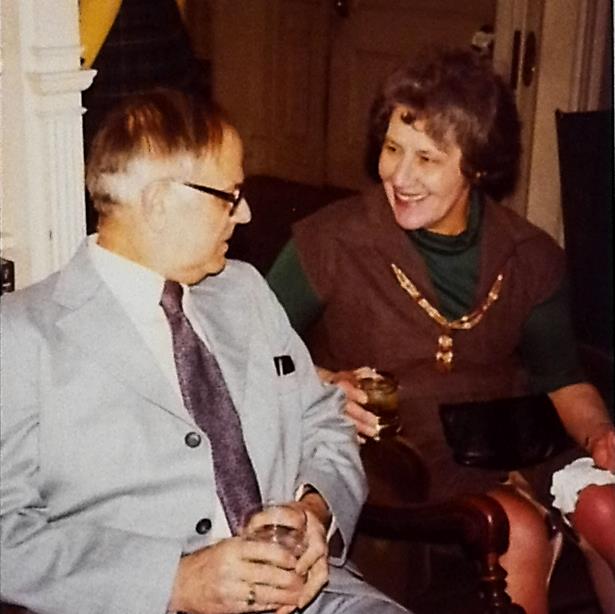
The Wards in 1979.
I never had the pleasure of meeting Mrs. Ward, as she was ill when I first arrived at Harvard, and passed away March 31, 2004. I’ve always regretted not meeting her, as her personality filled their home and I imagine her as full of life and joy, despite (or perhaps because of) a difficult life. She contracted polio as a youngster, and her father installed a swimming pool in their home so that she could exercise and regain the use of her legs. She was determined to walk as much and as long as possible, and though she wore braces on her legs for much of her adult life she succeeded in her determination. She participated in Ward’s teaching life from the beginning of their marriage, hosting regular dinners and parties for his students. The professor often credited the University of Illinois for this model, which he had found to be particularly socially active. He liked to bring his students together to talk, and found a home atmosphere particularly conducive to discussion. (I won’t mention the fancy Scotch involved in their graduate student parties.) When the Wards came to Harvard, they sought a house with a large area for entertaining but also one all on a single level, as they realized that Mrs. Ward would eventually be in a wheelchair.
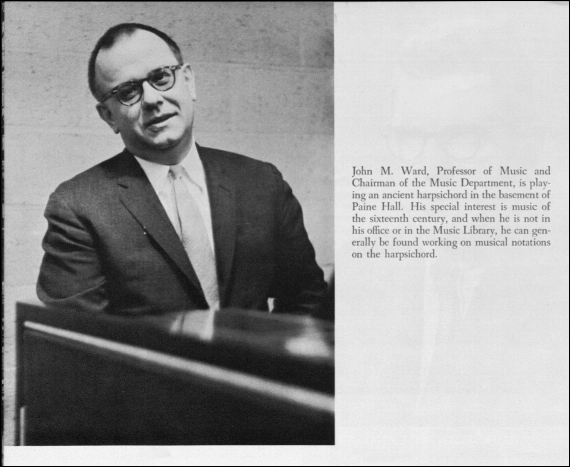
Ward in 1959. Throughout his teaching years, Ward played the piano, often in 4-hand arrangements with students.
John Ward taught many different courses at Harvard, and while he may be best remembered for “Music 200,” the formative research and writing course required of all graduate students in music, he also taught courses related to his own personal interests. Instrumental music of the 16th century, ethnomusicology, social dance, and music related to the stage (opera, musicals, ballet, and incidental music) also provide some insight into Ward’s later persona as collector and benefactor. His early training with Gombosi having instilled in him a need for access to primary sources for teaching and research, he often connected writing assignments to specific resources in the Harvard libraries. Many students will remember his story about the student who, on receiving a writing assignment extensively corrected in red, bemoaned, “It’s BLEEDING!” His goal was to highlight and elucidate important secondary resources, but also to explore related primary source materials. He loved to tell stories about the times he heard that students would discover notes in encyclopedia articles, saying “Hello, Music 200 student!” and the like. But formulating assignments related to primary sources was challenging in the above-cited areas of interest, as the library’s holdings at the time often didn’t provide the kind of material he wanted his students to explore. So he bought them. Sometimes through the library system, particularly when microfilms were popular, but increasingly with his own money, or to be more exact, that of his wife’s. Mrs. Ward had inherited money from her family; she supported his philanthropic endeavors and he was always careful to include her name on all of his donations.
One of Ward’s first major donations was to establish the Archive of World Music in 1976. Through the years he had found commercial and made field recordings in many areas then considered to be outside the Western music tradition. Some of his first purchases were recordings of Aretha Franklin’s father, C.L. Franklin, and he was fascinated by flamenco, to give some idea of the scope of his ethno interests. One of his most memorable research trips was to the Southwest and included participation in a Native American ritual, another fascination of his. Ward also supported the creation of the Charles Seeger Room at the Loeb Music Library in 1985, for printed and manuscript materials related to Ethnomusicology (see image at the top). Throughout his teaching career, he continued to find and fill in what he considered to be holes in the Harvard Libraries. Ward retired from active teaching in 1985, and his collecting activities increased as his personal research expanded. In the 1990s, he began to donate material in specific subject areas, and hired several successive research assistants to help him organize and document his purchases. Morris Levy, my predecessor here at Houghton, cataloged an immense portion of Ward’s gifts into HOLLIS, and worked with the professor to publish catalogs of his King’s Theatre and Italian Ballet collections.
He was actively collecting material on the French Revolution, as well as Lully and other French subjects at his death, with the intent to publish another catalog. I began working for Ward in 2002, cataloging a large collection of opera vocal scores that he donated to the Loeb Music Library, then moved here to Houghton to work on a continuation of that collection, as well as other performance-related materials. From the beginning of my tenure here, I was lucky enough to have enjoyed more of a mentorship from him than that of a simple employer and employee: I trained as an opera singer, and the world of musicology (seen through a Harvard lens) to which he introduced me changed my world view. His passion, and meticulous attention to detail, taught me to be a better cataloger and gave me a wider music view. I’ve written more about this in Gordon Hollis’s John Ward and his Magnificent Collection, but this upcoming centennial of his birth has had me thinking about him even more than I usually do as Ward Music Cataloger.
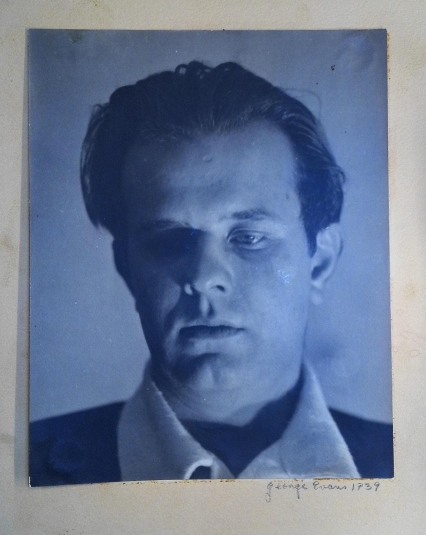
Ward photographed by George Evans, 1939
Ward died quietly at his home in Cambridge on 12 December 2011, at the age of 94. Much of this story has already been told, with the exception of a few of these more personal recollections. In the wake of Ward’s passing, and with our continued cataloging of his gifts, what can be added to the story? As of today, there are about 26,500 separate Ward Collection records in Harvard Library’s OPAC, HOLLIS, 425 of which represent large collections. And Ward’s gifts are on display in the RISM OPAC as well, with 2,369 records, most in the A/II series. (The siglum US-CAward denotes materials originally in Ward’s private collection, for which Ward engaged a RISM cataloger to create records; these materials now reside at Harvard and the present location is reflected in the RISM OPAC.) In 2015, an intensive RISM cataloging project for Ward materials at the Harvard Theatre Collection resulted in inventories for several large collections of manuscripts of Lully opera excerpts from the 18th century, including this fascinating miscellany, described in an earlier RISM blog post.
His collection has been heavily used, and features prominently in such diverse encyclopedic websites as The Italian Opera Aria on the London Stage, 1705-1801, and The Musical Festivals Database, the latter created by Charles McGuire, coincidentally one of the research assistants to John Ward that I mentioned earlier. Ward Collection materials have been cited in innumerable articles and books. The areas of Ethnomusicology, ballet, social dance, and operettas/musicals, which were not actively studied when Ward began collecting, are now areas of intense investigation, and Harvard’s collections are among the best in the world, thanks to him. And what do I think, about all this, on the centennial of his birth? I miss him. He often said he was just lucky, to be in the right place, at the right time. But I think he made his place, and made his time. And we are the lucky ones, to live in it. Here’s to another century of the Ward Collection!
Top image: John Ward poses in 1985 with the photo of Charles Seeger marking the entrance to the Charles Seeger Room at the Loeb Music Library. (Photo: Jacob Wainwright Love.) All images courtesy of Harvard University.
Share Tweet EmailCategory: Musical anniversaries

